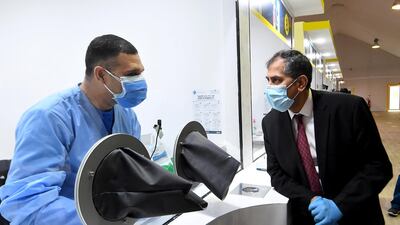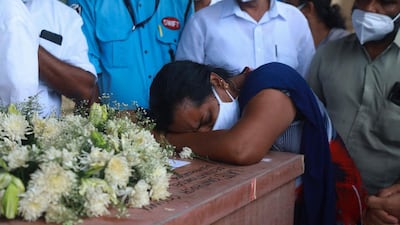The Indian ambassador to the UAE is counting on the support of the overseas community to reverse the tide of the deadly Covid-19 pandemic that has hit the country hard.
Pavan Kapoor, India's envoy to the Emirates in an indepth interview with The National, acknowledged that people and the government "let their guard down" when the second wave battered the nation.
He spoke of the resilience of the Indian community and outlined ramping up of testing and vaccination drives.
The aim is for a half a billion doses to be procured by August and more than 2 billion will be available by the end of the year covering the entire adult population.
Mr Kapoor stood by his government’s decision to initially distribute vaccines overseas saying solidarity was crucial during a “pandemic of unpresented nature that requires everyone to help each other because no one is safe until everyone is safe.”
Mr Kapoor also said the embassy was in regular talks with UAE authorities about resumption of incoming flights.
“We have to wait and see when conditions are right,” he said
“As much as we are keen for flights to resume so are the UAE civil aviation authorities. It’s an extremely important route and they will want to get this up and running. We have to wait and see when they are comfortable and we have to respect the safety of people.”
He asked for understanding from thousands stuck in India worried about losing their jobs in the Emirates and keen to return to their family.
India and UAE keen for flights to resume
“I think people have to be patient but they can be rest assured that we are talking to the UAE authorities. We don’t want to put a timeline to it because it’s a decision that the health authorities will take. I can tell you that they (UAE) are monitoring the situation carefully along with us.”
Regarding whether Indians could return to the UAE via countries deemed as safe and complete quarantine overseas, he said the mission had checked that this was permitted.
“We have clarified this and yes, if people are able to travel to countries identified as safe where they can spend 14 days in quarantine and then come here, that is still an option available,” Mr Kapoor said.
“We are not suggesting that this is what people should do. They have to take a call themselves.”
Incoming flights from India were suspended from April 24 to protect against a deadly Indian variant. Exemptions have been made for UAE citizens, diplomats, passengers on business aircrafts and golden visa holders.
India shocked by second wave
The country recorded the pandemic's highest known single-day death toll of 4,529 on Wednesday of more than 280,000 Covid-19 fatalities.
The number of infections continue to drop below the 300,000 mark this week but the virus has spread to rural districts now reeling from Covid-19 casualties.
There is anger and disappointment with the federal government for permitting huge crowds to gather at political rallies and religious festivals.
Before lockdowns currently in place, people attended family celebrations, weddings without wearing masks and moved gatherings to states with lax rules.
“We have to admit frankly that we were taken aback by the unanticipated surge in cases. It hit us very hard and we have to accept collective responsibility for the fact that as a community, as a people, as a government we all let our guard down thinking that things had got better,” Mr Kapoor said.
“It is extremely regrettable the number of deaths that have taken place and that is something we have to acknowledge very openly. Having said that, we see the resilience we have shown as a people. We have seen individuals, professionals, business tycoons, community, religious groups, even students stepping up to do whatever they can.”
Mr Kapoor spoke of organisations and individuals who provided medicines, food and oxygen concentrators.
“It’s a true sense of people coming together to assist the government at the state and central level to show we are all in this together. It is the only way we can overcome this.”
Vaccine ‘friendship’ for countries in need
There has been public criticism of the Indian government for sending more than 64 million doses to 85 countries as part of Vaccine Maitri or Vaccine Friendship drive.
Ministers in India have maintained this was not at the expense of citizens and a large portion were contractual obligations part of commercial contracts.
Mr Kapoor said the support the country received was due to the help it had extended.
“Countries have gone out of the way to help us with whatever we need. It is an acknowledgement by the world that this is a pandemic of unprecedented nature and requires everyone to help each other because no one is safe until everyone is safe,” he said.
The ambassador said there was hesitancy when inoculations first began and the Oxford-Astra Zeneca vaccine produced by Indian pharma company Serum Institute needed to be distributed before the expiry date.
In defence of the government’s decision to export doses, he said, “At that time there were spare doses. These were being sought by our partner countries who really needed them so we were absolutely right in helping them out. This pandemic is affecting everyone and not just us. We certainly are keen to help our friends and neighbours who also needed vaccines very urgently.”
Mr Kapoor said the country was grateful for support from the UAE, other Gulf nations, UK, US and nations ranging from Singapore to France.
UAE-India experts discuss virus mutation
Health care experts from both countries have met virtually to understand virus mutations.
“We have had close exchanges on health care and will keep consulting with the UAE. There was an exchange a few weeks ago discussing the genomic changes to this virus. This is to better understand variants in both countries.”
India appreciated the UAE support in sending ventilators, BiPap machines used for respiratory support and a million tablets of the antiviral favipiravir.
Ramping up to tackle Covid-19 spread
He outlined efforts from scaling up vaccine distribution to making oxygen available.
More than 185 million shots have been administered so far of Covishield, another name for the Oxford-AstraZeneca shot, and an indigenous jab Covaxin.
Russia’s Sputnik V has also been approved.
“We have got surety of 500 million vaccine doses by August and more than two billion by the end of the year,” he said.
Production of liquid medical oxygen has been pumped up from 5,600 metric tonnes a day in February to 9,500mt.
This was supplemented with liquid medical oxygen sourced from abroad, including the UAE, oxygen generation plants and concentrators.
Production of key medicines such as the antiviral remdesivir was pushed from 4 million vials a month to 12 million vials.
“We hope all these measures in terms of availability of essential medicines, equipment, oxygen availability, increased testing, vaccines production will help us control this pandemic,” he said.
“Along with the support of the international community and our own people, corporates in India and overseas are all contributing to this effort.”
Hard lessons learnt
Heart-rending scenes of patients struggling to breathe outside hospitals that could no longer admit people and funeral pyres lit in crowded cremation grounds opened up in parking lots have become a reality for many Indian families.
Mr Kapoor said officials had learnt lessons and the endeavour was to improve health facilities.
“This is no doubt an important juncture for us to realise where we are lacking and we will take our lessons and incorporate this in our plans,” he said.
“The government has made it clear they would put resources and budgets into the health infrastructure.”
He called on the community to shore up the spirits of family in India.
"One important contribution the Indian community here in the UAE can do is to be strong and a source of courage for their friends and family back in India," Mr Kapoor said.
“We need them to be responsible and make sure they don’t wittingly or unwittingly contribute any misinformation that leads to fear or panic.”












